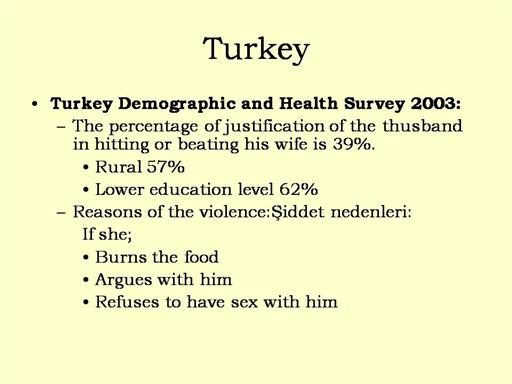| front |1 |2 |3 |4 |5 |6 |7 |8 |9 |10 |11 |12 |13 |14 |15 |16 |17 |18 |19 |20 |21 |22 |23 |24 |25 |26 |27 |28 |29 |review |
 |
Recent years have witnessed an increasing interest in
violence against women, in particular domestic violence. Domestic
violence against women is acknowledged worldwide as a violation of
the basic human rights of women. Tolerance and experience of
domestic violence form significant barriers to the empowerment of
women and women’s autonomy in
all spheres of social life and have adverse
consequences for women’s health, health-seeking behavior, and the
health of their children. In the TDHS-2003, women were asked a
number of questions on their attitudes regarding especially
physical violence, which is one of the special
types of domestic violence, with regard to whether
they viewed physical violence as justified
under given circumstances.
Women were asked whether a husband would be justified
in beating his wife for each of the following reasons separately: if
she burns the food, if she argues with him, if she spends too
much money, if she neglects the children, and if she refuses to have
sex with him. Table 3.6 gives the percentages of ever-married women
who agree with the specified reasons for
wife beating by background characteristics.
Thirty-nine percent of women accept at least one reason as a
justification for wife beating. Women are most likely to think
that wife beating would be justified in cases when
the woman argues with the husband (29 percent),
spends too much money (27 percent) and neglects the children (23
percent). Only 6 percent of women agree that wife beating would be
justified if the woman burns the food. Younger women, currently
married women, and women with high fertility are more likely
than their counterparts to think that wife beating is
justified for at least one of the reasons.
|